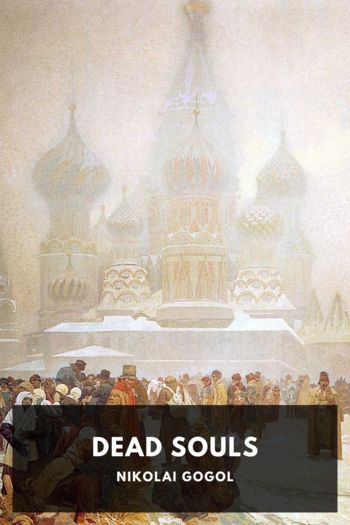Dead Souls - Nikolai Gogol (most life changing books .txt) 📗

- Author: Nikolai Gogol
Book online «Dead Souls - Nikolai Gogol (most life changing books .txt) 📗». Author Nikolai Gogol
However, his fears vanished the instant that the guest saluted him with marked politeness and explained, with many deferential poises of the head, and in terms at once civil and concise, that for some time past he (the newcomer) had been touring the Russian Empire on business and in the pursuit of knowledge, that the Empire abounded in objects of interest—not to mention a plenitude of manufactures and a great diversity of soil, and that, in spite of the fact that he was greatly struck with the amenities of his host’s domain, he would certainly not have presumed to intrude at such an inconvenient hour but for the circumstance that the inclement spring weather, added to the state of the roads, had necessitated sundry repairs to his carriage at the hands of wheelwrights and blacksmiths. Finally he declared that, even if this last had not happened, he would still have felt unable to deny himself the pleasure of offering to his host that meed of homage which was the latter’s due.
This speech—a speech of fascinating bonhomie—delivered, the guest executed a sort of shuffle with a half-boot of patent leather studded with buttons of mother-of-pearl, and followed that up by (in spite of his pronounced rotundity of figure) stepping backwards with all the elan of an india-rubber ball.
From this the somewhat reassured Tientietnikov concluded that his visitor must be a literary, knowledge-seeking professor who was engaged in roaming the country in search of botanical specimens and fossils; wherefore he hastened to express both his readiness to further the visitor’s objects (whatever they might be) and his personal willingness to provide him with the requisite wheelwrights and blacksmiths. Meanwhile he begged his guest to consider himself at home, and, after seating him in an armchair, made preparations to listen to the newcomer’s discourse on natural history.
But the newcomer applied himself, rather, to phenomena of the internal world, saying that his life might be likened to a barque tossed on the crests of perfidious billows, that in his time he had been fated to play many parts, and that on more than one occasion his life had stood in danger at the hands of foes. At the same time, these tidings were communicated in a manner calculated to show that the speaker was also a man of practical capabilities. In conclusion, the visitor took out a cambric pocket-handkerchief, and sneezed into it with a vehemence wholly new to Tientietnikov’s experience. In fact, the sneeze rather resembled the note which, at times, the trombone of an orchestra appears to utter not so much from its proper place on the platform as from the immediate neighbourhood of the listener’s ear. And as the echoes of the drowsy mansion resounded to the report of the explosion there followed upon the same a wave of perfume, skilfully wafted abroad with a flourish of the eau-de-cologne-scented handkerchief.
By this time the reader will have guessed that the visitor was none other than our old and respected friend Paul Ivanovitch Chichikov. Naturally, time had not spared him his share of anxieties and alarms; wherefore his exterior had come to look a trifle more elderly, his frockcoat had taken on a suggestion of shabbiness, and britchka, coachman, valet, horses, and harness alike had about them a sort of secondhand, worse-for-wear effect. Evidently the Chichikovian finances were not in the most flourishing of conditions. Nevertheless, the old expression of face, the old air of breeding and refinement, remained unimpaired, and our hero had even improved in the art of walking and turning with grace, and of dexterously crossing one leg over the other when taking a seat. Also, his mildness of diction, his discreet moderation of word and phrase, survived in, if anything, increased measure, and he bore himself with a skill which caused his tactfulness to surpass itself in sureness of aplomb. And all these accomplishments had their effect further heightened by a snowy immaculateness of collar and dickey, and an absence of dust from his frockcoat, as complete as though he had just arrived to attend a nameday festival. Lastly, his cheeks and chin were of such neat clean-shavenness that no one but a blind man could have failed to admire their rounded contours.
From that moment onwards great changes took place in Tientietnikov’s establishment, and certain of its rooms assumed an unwonted air of cleanliness and order. The rooms in question were those assigned to Chichikov, while one other apartment—a little front chamber opening into the hall—became permeated with Petrushka’s own peculiar smell. But this lasted only for a little while, for presently Petrushka was transferred to the servants’ quarters, a course which ought





Comments (0)